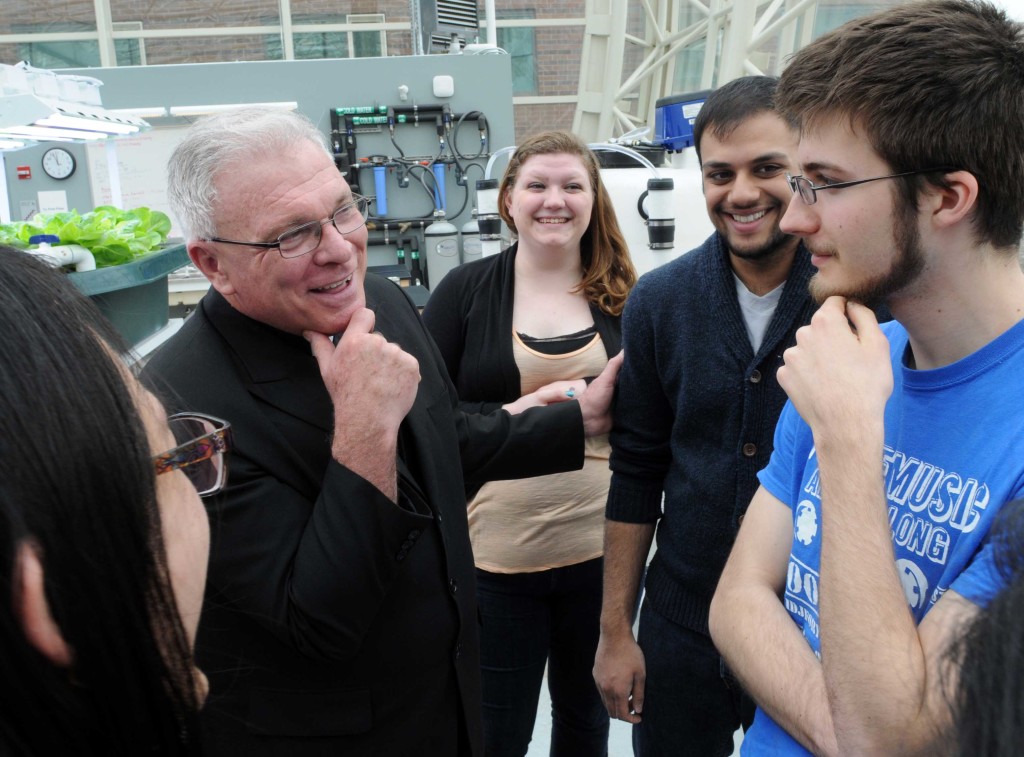Reverend Michael J. Garanzini, SJ
President, Loyola University Chicago
It’s a surprise to hear a Jesuit say he doesn’t come from a religious family. But Father Mike, as he’s known around campus, describes his Italian family as “hearty.” Part of it has to do with food, he explains, as he and his four siblings grew up in St. Louis working in restaurants.
He finds himself cooking several times a week, often for colleagues and students. “I’m in the zone when I’m cooking,” Father Mike says, flashing a big smile. “I don’t think of anything else except whether this dish I’m inventing needs more of this or that. Whether it should be served lukewarm, hot or cool. Whether there’s a certain wine that goes better with it. When I get into that zone for two hours to get a meal together, I’m really happy.”
Father Mike is also happy that Loyola faculty and staff can laugh again. “A lot has changed,” he says, noting that Loyola has continually evolved since he became president 13 years ago this June. “We have a good time and celebrate great things, which was very hard to do when I got here,” he admits. “We had enrollment issues, layoffs. There was real confusion as to who was in charge of what and a lot of anger. That has dissipated…I’m really happy about it.”
Lauded as ‘Mr. Fix-it’ in the media, Father Mike says the university (which has four local campuses and three international campuses) simply needed to “spruce things up by restoring Loyola’s sense of its importance to Chicago and its importance as a Catholic Jesuit institution. We lost some confidence when we had recruiting and financial difficulties.”
Before Father Mike joined Loyola, the school was drowning in debt with an operating deficit of roughly $35.2 million and enrollment of 12,605 – the lowest in years. By the end of the 2013 school year, Loyola was back in the black operating at a surplus of $31 million with 15,957 enrolled students. “But credit for these improvements really goes to a stellar group of deans and a loyal faculty,” insists Father Mike. “It’s not all me.”

Father Mike meets with students inside Loyola’s EcoDome greenhouse, a part of the new Institute of Environmental Sustainability.
Yet, you’d be hard-pressed to find another person as immersed in Loyola’s community as Father Mike. Visit the Lake Shore campus or pop into one of the dorms and you’ll likely run into him. “I live in Regis Hall,” he says, pointing west of his office in Burrowes Hall, which overlooks Lake Michigan. “I’ve lived in a freshman dorm for 25 years.”
Before Father Mike joined the Society of Jesus – the religious order that runs Loyola, about 200 other universities and over 3,000 high schools around the world – he earned degrees in English and Psychology from Saint Louis University in 1971. “I always wanted to be a teacher,” he recalls. “I graduated during tumultuous times, the Vietnam War, and was involved with student government and anti-war protests. I toyed with joining the Peace Corps, but a Jesuit scholastic suggested I join the Jesuits instead. He said, ‘If you try the Peace Corps, you’ll have to make another decision in two years when it ends. But if you join the Jesuits, you don’t have a make another decision for the rest of your life.’”
A Jesuit for over 40 years, Father Mike says his life has truly been enriched. “Through the Jesuits, I taught in Kansas City, earned a masters degree in American Literature from New York University and was ordained in Boston. Then I received a doctorate in Family Therapy, became a therapist, taught in San Francisco, spent a couple of semesters at Pontifical Gregorian University in Rome and got tenured in my home town of Saint Louis.”
After tenure, Father Mike became an administrator and has remained in this position the last 25 years. “I’ve always liked making things work and being involved with projects,” he explains. That may be why he’s also assistant to the Father General of his order and helps coordinate the Jesuit mission throughout 200 college institutions. “We’re also toying with how the Internet helps us reach places the Jesuits haven’t been before,” adds Father Mike. “We’re in deep conversation about new ways of starting a university. Can we still do the Jesuit thing if we were online more? Would we reach more people in Kenya, Nigeria and the Philippines? Would it be cheaper? The Jesuits have this [travel] bug. We need more. When the Jesuits see a town without a Jesuit school, we want to start one.”
His second job requires a lot of international travel, about six to eight times a year with one yearly trip to Rome. “I love to travel,” says Father Mike. “After my next trip to Rome later this year, I’ll take my vacation in Sicily where I have relatives. I like to go somewhere new for a vacation, usually with another Jesuit or two or three. We have to do it together to pool our allowance and share expenses.”
Yes, allowance. Father Mike has two high-powered jobs and doesn’t claim a paycheck, as the Jesuits take vows of chastity, poverty and obedience. Rather, the order gives him an allowance for living expenses and some leisure activities. “The Jesuits’ understanding of poverty isn’t simply have little to nothing,” he explains. “It’s living simply and in a dependency state. I depend on the community and kindness of others, and I’m content. I think everyone realizes, by the end of their life, that we cannot reassure ourselves with possessions. I don’t own anything. My car has been loaned to me. My apartment has been given to me. They’re not mine to keep.”
Plus, Father Mike doesn’t need money to have some fun at the students’ expense. “I tell them I have a pool and a Jacuzzi, but I really don’t,” he laughs. “Where I live is a mystery to them. They want to know what I have back there. So I ask if they’ve heard about the Jacuzzi. The Phoenix [Loyola’s student newspaper] even sent a photographer once to get a picture, and I had to deter them. There’s nothing back there…just a picnic table.” Guess the cat’s out of the bag.
